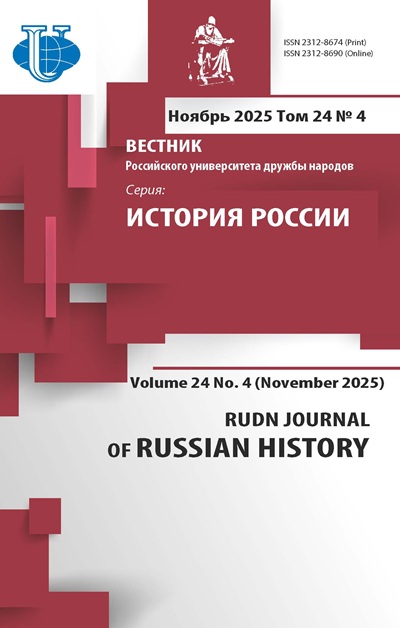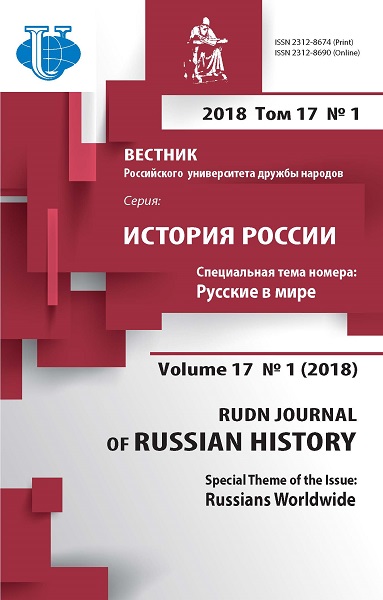Управленческий аппарат сталинской эпохи и несостоявшийся матч Алёхин - Ботвинник (1939-1940 гг.)
- Авторы: Олейников Д.И.1
-
Учреждения:
- Российский государственный гуманитарный университет
- Выпуск: Том 17, № 1 (2018): РУССКИЕ В МИРЕ
- Страницы: 74-91
- Раздел: РУССКИЕ В МИРЕ
- URL: https://journals.rudn.ru/russian-history/article/view/18531
- DOI: https://doi.org/10.22363/2312-8674-2018-17-1-74-91
- ID: 18531
Цитировать
Полный текст
Аннотация
Рассмотренная на основании новых архивных документов история несостоявшегося матча на первенство мира по шахматам между эмигрантом-невозвращенцем А.А. Алёхиным и чемпионом СССР М.М. Ботвинником существенно углубляет наши представления о нечастых в то время позитивных контактах «Руси советской» и «Руси зарубежной», а также демонстрирует способы и приемы деятельности советского управленческого аппарата сталинской эпохи. Проделанный анализ документов показывает, что именно управленческий аппарат на уровне СНК СССР и нового руководства Всесоюзного комитета по делам физической культуры и спорта сыграл ключевую роль в срыве шахматного матча, который мог стать знаковым для установления контактов СССР и мира Русского зарубежья.
Об авторах
Дмитрий Иванович Олейников
Российский государственный гуманитарный университет
Автор, ответственный за переписку.
Email: oleinikovdi@yandex.ru
кандидат исторических наук (Институт российской истории РАН, 1992), доцент кафедры истории и теории исторической науки Российского государственного гуманитарного университета
Россия, Москва, Миусская площадь, д. 6Список литературы
- «Никакие таланты не спасут Алёхина…» // Источник. 1997. № 6. С. 141
- Arcangeli Alessandro. Cultural history. A Concise Introduction. Routledge, 2012. Р. 16.
- Bernstein, Seth. Valedictorians of the Soviet School: Professionalization and the Impact of War in Soviet Chess // Kritika: Explorations in Russian and Eurasian History - Volume 13, Number 2, Spring 2012 (New Series) P. 395-418
- Brooklyn Daily Eagle. 19 May 1929. Р. 7
- Hudson Michael. Storming Fortresses: A Political History of Chess in the Soviet Union, 1917-1948. Ph.D., HistoryUCSantaCruz, 2013. Р. 257-261
- Hudson Michael.Storming Fortresses: A Political History of Chess in the Soviet Union, 1917-1948. Ph.D., History UC Santa Cruz, 2013
- Leonard M. Skinner, Robert G. P. Verhoeven. Alexander Alekhine’s Chess Games, 1902- 1946: 2543 Games of the Former World Champion. - Jefferson, N.C.; London, 1998. Рр. 635-658
- Riordan, James. Sport in Soviet Society. Development of Sport and Physical Education in Russia and the USSR. Cambridge University Press, 1977. Р. 139-140
- Winter, Ed. Capablanca. Jefferson, N.C.; London, 1989. Р. 240
- Ботвинник М.М. Шах двадцатому веку. М.: АСТ, «Зебра Е», 2010
- Ботвинник М.М. Шах двадцатому веку. М.: АСТ, «Зебра Е», 2010. С. 121
- Ботвинник М.М. Шах двадцатому веку. М.: АСТ, «Зебра Е», 2010. С. 126.
- ГА РФ. Ф. 7576. Оп. 21. Д. 89. Лл. 4-5.
- ГАРФ. Ф. 5446. Оп. 24а. Д. 322. Л. 14.
- ГАРФ. Ф. 5446. Оп. 24а. Д. 322. Л. 4
- ГАРФ. Ф. 5446. Оп. 24а. Д. 322. Листы дела подшиты в обратном хронологическом порядке, и соответственно пронумерованы по убыванию, начиная с Л. 56
- ГАРФ. Ф. 5446. Оп. 24а. Д. 322. Лл. 32-34
- Ильин-Женевский А.Ф. Несколько слов об Алёхине / Матч Алёхин - Капабланка на первенство мира: сборник всех партий матча / Г. Я. Левенфиш и П. А. Романовский; [предисл.: А. Ильин-Женевский]. - Ленинград: Изд-во ВСФК «Шахматный листок», 1928. С. 4
- Интервью М.М. Ботвинника // Осень шахматиста [1990]: документальный фильм / Сценарий И. Петров, режиссер В. Виноградов. [ТПО «Союзтелефильм», «Экран»; Студия документальных телефильмов].
- Котов А.А. Александр Алехин. М.: Физкультура и спорт, 1973. 254 с. (Выдающиеся шахматисты мира)
- Левин Е.А. Феномен политизации шахматного спорта в СССР // Современные исследования социальных проблем. Электронный научный журнал. №11 (55). 2015. URL: www.sisp.nkras.ru
- Линдер И.М., Линдер В.И. Александр Алехин: жизнь и игра М.:АСТ:Астрель, 2007 (Энциклопедия шахматного Олимпа)
- Осень шахматиста. Михаил Ботвинник. Режиссер В. Виноградов. М., 1990
- РГАСПИ. Ф. 17. Оп. 125. Д. 473. Л. 40.
- Репина Л.Г. Историческая наука на рубеже XX-XXI веков: социальные теории и историографическая практика. М.: Круг, 2011. С. 93-94
- Станислав Железный. Сталин хотел, чтобы я сыграл с Алёхиным (Беседа М.М. Ботвинника с С. Железным) // Красная звезда, №187 (21474), 17 августа 1994
- Филиппов А.Н. Государственная политика СССРвобласти физической культуры и спорта: 1920-1930 гг.: Дис.. кандидата исторических наук. 07.00.02. [Место защиты: Ярослав.гос. ун-т им. П.Г. Демидова]. Ярославль, 2012. С. 157, 163-165, 184
- Шабуров Ю.Н. Алехин. М.: Молодая гвардия, 2001. (Жизнь замечательных людей. Вып. 794. С. 94)
Дополнительные файлы















